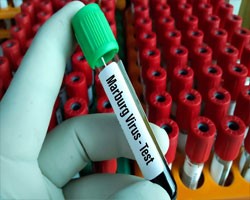Key Highlights:
Rwanda successfully managed its first-ever outbreak of Marburg Virus Disease (MVD), officially declaring the outbreak over on December 20, 2024, as per the World Health Organization (WHO). The declaration followed a 42-day countdown with no new cases after the last patient tested negative for the virus twice.
Overview of the Outbreak:
The outbreak was initially confirmed on September 27, 2024, and ended on November 7, 2024. A total of 66 confirmed cases and 15 fatalities were recorded, with a case fatality rate (CFR) of approximately 22.7%, marking a new benchmark for managing filovirus outbreaks in the region. About 80% of infections occurred among healthcare workers.
Rwanda’s Response Measures:
The Rwandan health authorities, with support from WHO, implemented a robust response that included:
Disease surveillance and extensive testing.
Infection prevention and control measures.
Strict contact tracing and clinical care.
Public awareness campaigns to educate communities about prevention and symptoms.
The response significantly curtailed the virus's spread, reducing cases by 90% after the third week of detection.
About Marburg Virus Disease (MVD):
Marburg Virus Disease is a severe and often fatal illness in humans with a CFR ranging from 24% to 88% in past outbreaks. It is initially transmitted to humans from fruit bats and spreads through contact with bodily fluids of infected individuals or contaminated surfaces. The disease is named after Marburg, Germany, where the first cases were identified in 1967. Most outbreaks have occurred in sub-Saharan Africa, including countries like Tanzania, Uganda, Angola, and Ghana.
Recent Advances in MVD Management:
There are currently no approved vaccines or antiviral treatments for MVD, but several vaccines, including the Sabin Vaccine Institute’s single-dose vaccine, are under development and in Phase 2 trials in Uganda and Kenya. Rwanda received investigational vaccines during the outbreak. The WHO deployed 20 global filovirus experts and mobilized 39 health experts from the AVoHC-SURGE cohort, marking the largest deployment of first responders for an outbreak. WHO will continue supporting Rwanda’s Ministry of Health to implement care programs for MVD survivors, addressing long-term after-effects.
Significance of Rwanda’s Efforts:
Rwanda’s 22.7% CFR sets a regional benchmark for managing filovirus outbreaks. It highlights the importance of committed leadership, collaborative efforts, and robust health systems in tackling public health emergencies. It also showcases how swift and coordinated action can save lives and contain deadly diseases effectively.
